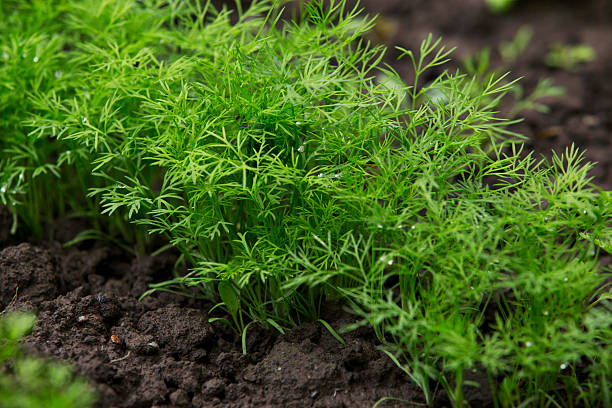

Anethum graveolens L.
|
It is commonly known as Sowa and belongs to the Apiaceae family. It is a leafy vegetable. Bergapten, Imperatorin and Marmesin are the coumarins present as bioactive compounds. Flower extracts showed anti-inflammatory effect in LPS-stimulated RAW 264.7 cells by inhibiting iNOS expression and mRNA expression of cytokines such as IL-1 and IL-6. Mode of Consumption : Sauteed and fried |
| Plant Details | Agro-climatic Zone | Vernacular Names | Pictures |
| Scientific Name: Anethum graveolens L. Family: Apiaceae Lindl. Class: Magnoliopsida Order: Apiales Genus: Anethum L. Fruiting Season: September to December Parts: Leaves |
|
Andhra Pradesh : Sompa, Shatakupivittulu, Pedda sadaapra, Sowa, Soyikura-vittulu, Sa-ta pu spa Bihar : Soya, Sowa, Sutopsha, Soyah, Suva Delhi : Soya, Sowa, Sutopsha, Soyah, Suva Gujarat : Suva Haryana : Soya, Sowa, Sutopsha, Soyah, Suva Jharkhand : Soya, Sowa, Sutopsha, Soyah, Suva Karnataka : Sabasi, Sabbasige, Sabbasagi, Sabbasige soppu Kerala : Chatakuppa, Satakuppa, Shatakuppa Madhya Pradesh : Soya, Sowa, Sutopsha, Soyah, Suva Maharashtra : Balantashopa, Sepo, Shepu, Shopha, Shupa, Suva, Surva Manipur : Pakhon Rajasthan : Soya, Sowa, Sutopsha, Soyah, Suva Tamil Nadu : Kattucata kuppai, Saddacooppei, Satakuppai, Cadakuppai, Cikkuyatti, Coyikkirai, Cutavari, Jananamali, Vimotam, Vittimam, Vilankalam Telangana : Sompa, Shatakupivittulu, Pedda sadaapra, Sowa, Soyikura-vittulu, Sa-ta pu spa Uttar Pradesh : Soya, Sowa, Sutopsha, Soyah, Suva Uttarakhand : Soya, Sowa, Sutopsha, Soyah, Suva |
 Plant |
| Compound/Extract | Activity | Mode of Action | Marker/References |
| Flower extract | Anti-inflammatory | Flower extracts showed anti-inflammatory effect in LPS-stimulated RAW 264.7 cells by inhibiting iNOS expression and mRNA expression of cytokines such as IL-1 and IL-6. | NO, IL-1, and IL-6[1] |
| Dill extract | Antioxidant, Anti-inflammatory | Dill extract significantly downregulated TNF-α, IL-6 and iNOS and also upregulated Nrf2 and HO-1 signaling activity in the liver and kidney of nicotine-exposed mice offspring. | TNF-α, IL-6, iNOS, Nrf2, and HO-1[2] |
| Dill seeds | Anti-inflammatory | Dill seeds inhibited cellular inflammation, NO production and the expression of inflammatory proteins (iNOS and COX2 etc.), cytokines (IL-1β and TNF-α) and nuclear transfer factor related to NF-κB signaling caused by LPS stimulation in vitro. | NO, iNOS, COX2, IL-1β, TNF-α, and NF-κB[3] |
| Leaves and Root extract | Antioxidant, Anti-inflammatory, Hepatoprotective | In paracetamol-induced acute liver toxicity in mice, ALT, AST, ILieww-1β, TNF-α, IL-6 and IL-10 levels were significantly lowered when treated with Leaf & Root extracts. | ALT, AST, IL-1β, TNF-α, IL-6, and IL-10[4] |
| Dill tablet | Anti-hypercholesterolemic, Anti-hypertriglycemic | Dill tablets (6 tablets for 2 months) decreased total cholesterol more than Gemfibrozil (P < 0.05), in a clinical study on 91 hyperlipidemic patients. | [5] |
| Dill tablet | Anti-inflammatory | Supplementation of type 2 Diabetic patients with Dill tablets for 8 weeks showed a significant reduction in inflammatory biomarkers IL-6, TNF-α and CRP levels. | IL-6, TNF-α, and CRP[6] |
| Major Class | Metabolites (Content of bioactives: mg/100g Fresh Weight) |
| Carboxylic Acid | Gallic acid: 1287 mg/100g, Vanillic acid: [9] |
| Coumarin | Bergapten: , Imperatorin: , Marmesin: [9] |
| Phenolic acid | p-Hydroxybenzoic acid: , Salicylic acid: [9] |
| Terpene | α-Phellandrene: [7] |
| Terpenoid | 1-dihydrocarveol: [7] |
| Effect | Observation | DOI |
| Disease | Formulation | Reference | Author | TKDL |
| Information from Wealth of India | Reference |
|
CSIR(1948).The Wealth of India, Raw materials,Vol.-I ,P.78-79, New Delhi, India |
| 4.2, 04.2.1, 04.2.1.1, 04.2.1.3, 04.2.2.5, 04.2.2.6, 04.2.2.8 |
| CSIR-North East Institute of Science and Technology, Jorhat-6, Assam, India
CSIR-Institute of Himalayan Bioresource Technology, Palampur-61,Himachal Pradesh, India |